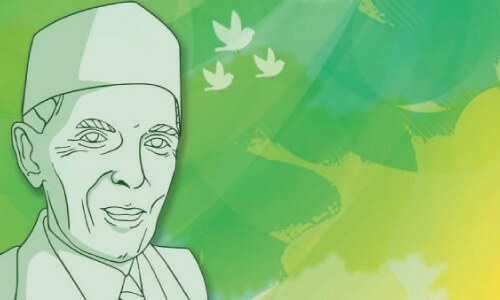
EXACTLY one hundred years ago, in 1923, Mohammad Ali Jinnah, then aged 47, was in the middle of a crucial transition.
With his brilliance as a barrister and political leader already proven in previous years, he was on the threshold of a transformation that would climax in the creation of Pakistan. In 2023, readers — and leaders — who make the mistake of perusing the content herein may find it a source for reflection on how fortitude can overcome formidable travails.
In 1923, in all three spheres — personal, professional, political — during events and trends either already evident or still unfolding, where there was a rewarding resumption of focus in one sphere — his professional legal practice — there was ferment and uncertainty in the other two, combined with some indicators of self-assertion and renewal.
The world in ’23
Jinnah was living in eventful times. Across the globe, some momentous actions and themes were either underway or beginning to emerge that year. The Mussolini-led Fascists came to power in Italy. Hitler was belatedly arrested for attempting what came to be called the Munich Beer Hall Putsch. French and Belgian troops had entered the Ruhr area of Germany to seek reparations for World War I (1914-1918). Ireland became independent.
“The capacity of Pakistan’s leadership in 2023-24, facing complex conditions and the civil-military misequation, would be purposefully advanced if they were to revisit Jinnah’s passage through difficult times in the first half of the 1920s”
An American Secretary of State refused to recognise the USSR. Turkey and the Allies signed a peace agreement.
Turkey declared itself a Republic, and Mustafa Kamal Ataturk became President.
Trans-Jordan became autonomous.
Though it had signed a debt repayment agreement with the USA for liabilities incurred during WWI, the sun still shone over the British empire in Asia, Africa and in patches elsewhere. Over 100,000 people perished in an earthquake in Japan. Lee de Forst screened sound-on-moving pictures for the first time in New York, even as dinosaur eggs were first discovered.
The electric traffic signal was patented. It became legal for women to wear trousers in the USA, and the first Labour Day — May Day — was observed in South Asia when a red flag was hoisted in Madras.
Being the well-informed, voracious reader that he was, M.A. Jinnah surely remained updated on all of these developments in the world in which he lived.
As also, on the internal situation. Motilal Nehru and others had launched the Swaraj Party. Diverse entities attempted a range of political initiatives. Lord Reading governed as Viceroy. And the British stalled and diverted demands for outright freedom.
Personal passions and distances
Jinnah’s fairy-tale romance with Ruttie had been marked by marriage five years earlier, on April 19, 1918. The 18-year-old beauty had converted from the Zoroastrian faith to become a Muslim in order to marry him. At 42, he was more than double the age of his bride.
He knew she had paid a very high price for their union: ostracism by her father and most of her family and community.
Despite his own formal mannerisms, he liked her flamboyant style and her zestful persona and was clearly smitten.
After the birth of their daughter, later named Dina — by a remarkable coincidence, on the midnight of August 14-15, 1919 in London, the date which 28 years later would see the birth of Pakistan and India as two new nation-states — the matrimonial passion of the first few years had been somewhat cooled by his frequent political travels and tasks, and by his legal practice. While Ruttie continued appearing with him at political and social events, including for robust campaign work when he contested the polls in 1923 and 1926, she was beginning to be disappointed by his preoccupations elsewhere.
The tragic decline in the frequency of their times together led to her untimely death in 1929, which occurred after only 11 years of wedlock. He never quite recovered from her loss.
A painful episode

In the political sphere, the two years prior to 1923 saw him retreat from the hyperactive political pace to less hectic engagement. This relatively diminished level was largely due to a painful event: the unprecedented hostility he had faced from over 14,500 delegates at the Nagpur session of the Congress at the end of 1920, when he was the sole major leader to oppose Gandhi’s call for civil disobedience.
Jinnah presciently foresaw that this ostensibly non-violent agitation was likely to lead to disorder, violence and derailment of the peaceful movement for self-governance. He compounded this unpopular, though rightful stand by insisting on referring to the Congress leader as ‘Mr’ Gandhi, ignoring the loud demands for him to use the term “Mahatma”.
When he stoutly persisted in his views, cries of “shame, shame”, boos and hisses were hurled at him as he concluded his speech.
As Stanley Wolpert recounts in his biography Jinnah of Pakistan, a British official wrote to his senior that “… Jinnah carried no influence. It was the most bitterly humiliating experience of his public life.”
Perhaps that single, scorching episode turned him more inward and impassive. It must have stiffened his will to conceal emotion and thus put a seal of enduring impenetrability on his actual feelings.
Toward Muslim nationalism
Simultaneously, on the plane of strategic political thought, that same episode possibly also changed forever the ambassador of Muslim-Hindu unity into a great exponent of Muslim nationalism. However, his new, steadily intensifying conviction about the exclusivity of Muslim national identity was not accompanied by a rejection of the validity of Hindu identity nor of bitterness and hate against the majority community.
The incident only seems to have crystallised his latent, till-then-unacknowledged belief that destiny lay in peaceful but separate co-existence, while also urging Muslim-Hindu unity to end colonial overlordship.
And he knew even then that there were sizable parts of the Muslim community — especially those driven by religious, emotive passion rather than a balance between reason and passion — which opposed the concept of separate, distinct Muslim nationalism.
Like some sour icing on a cake, that experience came at a time when the Muslim Khilafat leaders, such as the Ali brothers — Shaukat and Mohammad — were completely aligned with Gandhi and the Congress. Most of the Muslim leadership misconstrued and misrepresented Jinnah’s opposition to the restoration of the Caliphate and to the pursuit of satyagraha as being “traitorous” to the nationalist cause.
In contrast, Jinnah’s vision transcended to a more insightful, progressive level. It would take another 15 years before the bulk of the Muslim community and its main stewards comprehended the sagacity of his leadership and extended full support.
That road to cheers and triumph — in stark, sweet contrast to the jeers at Nagpur — was still several years ahead in the unknown future. For the present, in 1923, having also resigned in March 1919 from the Legislative Assembly to protest against the Anarchical and Revolutionary Crimes Act (otherwise known as the draconian Rowlatt’s Act, revoked only in March 1922), he was not an elected representative of a state institution.
Return to parliament
In Bombay, with his bar practice prospering and among people, particularly Muslims, who still mostly stood by him, he refused to permit the memory of Nagpur to inhibit him. He resumed the process of convening meetings and addressing conferences on a periodic basis.
He had also already parted with the Home Rule League, of which he had been President. His colleagues in the Muslim League had yet to realize the errors they had made in converging with the civil disobedience movement, Gandhi and the Khilafat leadership.
In reflection of his fair-mindedness, despite their fundamental disagreements, Jinnah stated in February 1921 at the Poona Servants of India Society conference, that: “Undoubtedly, Mr Gandhi is a great man and he (Jinnah) had more regard for him than anybody else. But he (Jinnah) did not believe in his (Gandhi’s) programme and could not support it”.
Just a year later, in February 1922, after incendiary violence in which 22 policemen were killed, Mr Gandhi was obliged to call off the satyagraha movement. This reversal proved how far-sighted and wise Mr Jinnah’s approach was to the power of peaceful mobilisation.
His return to full-blooded political activism was catalysed by his decision to contest for a separate seat for Muslims under a separate electorate in the Central Legislative Assembly. In November 1923, he was returned unopposed from a Bombay constituency.
Early the next year, he commenced making significant, direction-setting contributions to law-making and equity. Three examples suffice: opposition to the requirement of passports for entry/re-entry into British-occupied South Asia; extension of the adult franchise on the basis of literacy instead of payment of land revenue; use of rupees in bids for official tender contracts instead of bids only in sterling pounds in London.
Outside the Assembly, his re-entry into regular party activities took place when he was re-elected president of the Muslim League in its Lahore session in May 1924. The capacity of Pakistan’s leadership in 2023-24, facing complex conditions and the civil-military misequation, would be purposefully advanced if they were to revisit M.A. Jinnah’s passage through difficult times in the first half of the 1920s. If it is believed that “life begins at 40”, then his life illustrates how, even during mid-life at 47, one may open new pathways to achievement.
The writer is a former senator and federal minister and the author of, among other books, Pakistan — unique origins; unique destiny?















































Dear visitor, the comments section is undergoing an overhaul and will return soon.